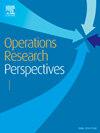基于瓦瑟斯坦计量法的道路中断情况下人道主义物流问题的分布稳健性
IF 3.7
4区 管理学
Q2 OPERATIONS RESEARCH & MANAGEMENT SCIENCE
引用次数: 0
摘要
人道主义物流在灾害管理中发挥着至关重要的作用。然而,在解决救灾物资预置问题以有效应对自然灾害时,人道物流往往面临道路状况不可预测的挑战。本研究探讨了人道主义物流中救灾物资的位置分配问题。研究的重点是确定物资分配点的最佳数量和位置,并制定有效的救灾物资分配方案。在此,我们提出了一个两阶段编程模型,利用分布稳健优化(DRO)方法来解决考虑不确定路况时的位置分配问题。DRO 方法优化指定模糊集中所有分布的最坏情况期望值。救灾设施位置、库存水平和救灾物资分配计划都是同时确定的。通过使用瓦瑟斯坦度量法,可以创建一个模糊集来描述各环节的不确定性。该度量可以捕捉基于有限样本信息的不确定性,确保真实分布大概率包含在所构建的集合中。为了解决这个问题,我们开发了一种基于本德斯分解的算法。为了验证模型和方法的有效性,我们对墨西哥湾地区飓风造成的威胁进行了实际案例研究。通过与基于情景的随机编程模型和传统鲁棒模型进行比较,我们评估了所提模型的性能。此外,我们还根据分布稳健优化方法在人道主义物流中的应用提出了管理见解。本文章由计算机程序翻译,如有差异,请以英文原文为准。
Distributional robustness based on Wasserstein-metric approach for humanitarian logistics problem under road disruptions
Humanitarian logistics plays a vital role in disaster management. However, it often faces the challenge of unpredictable road conditions when solving relief prepositioning problems to effectively respond to natural disasters. This study examines the location–allocation problem in humanitarian logistics for disaster relief supplies. The research focuses on determining the optimal number and locations of supply distribution points and developing an efficient allocation scheme for relief items. Herein, we propose a two-stage programming model utilizing the distributionally robust optimization (DRO) approach for the location–allocation problem when considering uncertain road conditions. The DRO approach optimizes the expectation value of worst-case across all distributions within a specified ambiguity set. Relief facility locations, inventory levels, and relief supply distribution plans are all determined simultaneously. By utilizing the Wasserstein metric, an ambiguity set is created to characterize the link-wise uncertainties. This metric can capture uncertainties based on finite sample information, ensuring with high probability that the true distribution is contained within the constructed set. To address the problem, We develop an algorithm based on Benders decomposition. To validate the efficacy of the model and methodology, we conduct a real-life case study on the threats posed by hurricanes occurring in the Gulf of Mexico region. We evaluate the performance of our proposed model by comparing it to the scenario-based stochastic programming model and the traditional robust model. Furthermore, we offer managerial insights based on the application of distributionally robust optimization methodology in humanitarian logistics.
求助全文
通过发布文献求助,成功后即可免费获取论文全文。
去求助
来源期刊

Operations Research Perspectives
Mathematics-Statistics and Probability
CiteScore
6.40
自引率
0.00%
发文量
36
审稿时长
27 days
 求助内容:
求助内容: 应助结果提醒方式:
应助结果提醒方式:


